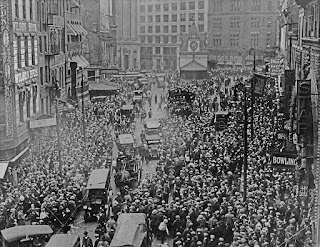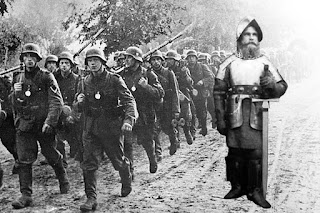Forty Eight Hours of Mayhem! The Boston Police Department Strike of September 9, 1919 & the Fight for Police Unions
By sundown a crowd of over 10,000 people had gathered in Boston’s Scollay Square. As the sun dropped below the horizon and the day’s light faded into darkness the looting and rioting began.
Within moments, on the night of September 9, 1919, the professors and undergraduate students from nearby Harvard University that had been hastily sworn in and pressed into service as temporary police officers by Boston’s Mayor Andrew James Peters were completely overwhelmed.
Scollay Square, then the main city square in Boston and home to the city’s vibrant commercial downtown in 1919, and today the site of Boston’s City Hall Plaza, quickly became the epicenter of rioting and looting in the wake of the Boston Police Department Strike of 1919.
That night, September 9, 1919, and on into the next night, rowdy young people threw rocks through shop windows, looted storefronts, overturned streetcars and smashed vendor stalls in an orgy of destruction. Without a professional police force to keep order, Boston, literally overnight, fell victim to mob rule.

Rioting in Scollay Square September 10, 1919
In an effort to improve working conditions and gain higher wages, police officers in the city of Boston had attempted to unionize. In June of 1919 the American Federation of Labor, under the leadership of Samuel Gompers, had begun to recognize police unions in major cities across the United States as charter members. Already, police forces in Washington DC, Los Angeles and Miami had all had their union charters recognized by the AFL.
But local leaders in Boston led by then Massachusetts Governor Calvin Coolidge and supported by local Police Commissioner Edwin Upton Curtis refused to recognize the right of police officers, firefighters and teachers within the city to unionize, let alone strike.
Just prior to the Boston Police Department Strike of 1919 Coolidge had publicly declared that, “There is no right to strike against the public safety by anybody, anywhere, anytime.”
 |
| Calvin Coolidge |
All negotiations for better working conditions, or wage increases between Commissioner Curtis and the Boston Police Department, by the beginning of September 1919 had completely broken down, despite the fact that the Boston PD had a list of valid grievances about a mile long.
In 1919 police officers in Boston typically worked 10 or 12 hour shifts, with no breaks, and would normally average anywhere between 75 and 90 hours a week on duty. If required to appear in court police officers were not paid for the time spent away on their appearances and often, while on duty, were required to perform tasks such as collecting taxes, monitoring polls on election day, conducting city wide censuses and acting as errand boys for city officials. Additionally, most police stations in Boston at the time were decrepit and falling into disrepair, having been built prior to the American Civil War, and most lacked electricity or even running water.
Perhaps, most egregiously of all, pay for new police officers in the city of Boston by the summer of 1919 had not risen in over 50 years since 1857! Members of the Boston Police Department, by the time of the strike on September 9, 1919, were among the lowest paid laborers in the city making less than half the average wage of an unskilled day laborer.
Leading up to the strike, during negotiations between representatives of the Boston Police Department and Massachusetts Governor Calvin Coolidge, an offer was made by the Governor to increase wages, but Police Commissioner Curts held firm, and began to recruit an impromptu force of about 200 Harvard undergraduates and local businessmen to act as a temporary police force in the event of a generalized police strike.
Though, at first, Coolidge was willing to make certain concessions to the Boston Police Department, national opinion had begun to swing wildly against the idea of a strike by the Boston Police Union.
Egged on by Coolidge, and Police Commissioner Curtis, papers around the country began to report that members of Boston’s Police Union were, “Bolshevik sympathizers” and “Leninists” who sought the ruin of law and order.
Massachusetts Senator Henry Cabot Lodge called a potential Boston Police Department strike, “the first step towards Sovietizing the country.”
With their grievances left unaddressed and being unfairly labelled as communists and traitors by many members of the media, on the evening of September 9, 1919 almost the entirety of Boston’s police force, one of America’s oldest continuously operating Police Departments founded in 1838, simply walked off their jobs or refused to report for work and went on strike.
Forty eight hours of mayhem ensued. Petty criminals and thugs took advantage of the situation the moment the police went on strike and the sun went down. There were dice games and bookies taking bets in the streets. Angry crowds assaulted one another over petty grievances and a frenzy of looting downtown continued until sunrise.
In the morning both Mayor Peters and Governor Coolidge each scrambled to save their ass.
Mayor Andrew James Peters released a press statement saying that he, “was not to blame for the tumult, rioting and violence that had occured within the city,” and that the Massachusetts State Guard should be deployed to restore order.
Governor Coolidge released his own statement saying that he would, “Order the Massachusetts State Guard to save the city of Boston.”
The untrained volunteers that had been recruited as an interim police force in the wake of the strike, ran for their lives and were surrounded outside police stations by angry mobs that shouted, “Kill the cops! Kill the cops!”
Reluctantly, striking officers in many instances, broke their strike only to protect those same individuals who had been recruited to replace them from these blood thirsty mobs.
But despite the Boston Police Department’s legitimate grievances, and despite the fact that it was the lack of a professional police force which had caused the city of Boston to descend into lawlessness on the night of September 9, 1919, Governor Coolidge and other anti-union politicians in Massachusetts were able to spin the blame onto the striking police, label them as Communist sympathizers and cause an anti-police and anti-union backlash to ripple across the United States.
On the morning of September 10, 1919 when reporting on the Boston Police Department strike the Los Angeles Times stated, “No man’s house, no man’s wife, no man’s children will be safe if the police force is unionized and made subject to the orders of Red Unionite bosses.”
The Philadelphia Public Ledger reported that, “Bolshevism in the United States is no longer a specter. Boston in chaos reveals its sinister substance.”
A headline in a newspaper in Washington D.C. read: SENATORS THINK EFFORT TO SOVIETIZE THE GOVERNMENT HAS STARTED!
President of the United States Woodrow Wilson labelled the Boston Police Department strike, “A crime against humanity.”
With national opinion firmly on his side, Governor Coolidge was able to order that upwards of 2000 heavily armed soldiers be deployed to Boston to restore order.
Fearing that there might be a general citywide strike, Boston Mayor Peters had begun negotiations with members of the Police Union, and the Union itself had expressed a desire to return to work to restore order in the city.
 |
| Mayor Andrew James Peters |
But, now seeing himself as an anti-union and anti-communist crusader, Governor Coolidge refused to negotiate at all with the fledgling Boston Police Union and instead reiterated that, “no one, at any time had any right to strike and put the public safety in jeopardy.”
Rioting and looting continued in Boston but soon thousands of heavily armed soldiers from the Massachusetts State Guard (the precursor to today’s Army National Guard) flooded into the city and violently restored order.
Nine civilians would be killed by the Massachusetts State Guard, including several women. Most of the deaths occured when Governor Coolidge ordered a cavalry charge on the night September 10, 1919 in an effort to break up the large crowds that gathered on Scollay Square for the second night in a row.
 |
| Soldiers Patrol in Boston during the Strike |
Despite having so much blood on his hands, Coolidge for taking such decisive action and a firm stance against the “Bolshevik” striking members of the Boston Police Department, would be labelled a national hero by the press and would ride his wave of popularity all the way to the Presidency of the United States in 1923.
Sadly, the Boston Police Department Strike of 1919 would be broken when the city was able to hire approximately 1500 unemployed World War I veterans and train them as new police officers by the winter of 1920. None of the officers who went on strike in 1919 ever returned to work for the city of Boston.
But, Boston’s new police force recruited from First World War veterans would be hired at a better pay grade than their predecessors and the city would begin to invest more money into its police force to improve working conditions and facilities for its officers. And despite the efforts of many opponents, Police Unions in many towns and cities across the United States would continue to grow and expand throughout the twentieth century.
Though the Boston Police Department Strike of 1919 may not have succeeded in achieving its immediate goals, and though every police officer in Boston at the time may have unfairly lost their job as a result of what they did, every police officer, firefighter, teacher and civil servant in America today definitely owes those brave cops who so fervently stood up for their rights over one hundred years ago a debt of gratitude for helping to improve the wages and working conditions of the brave men and women in blue who protect and serve all of us.





Comments
Post a Comment